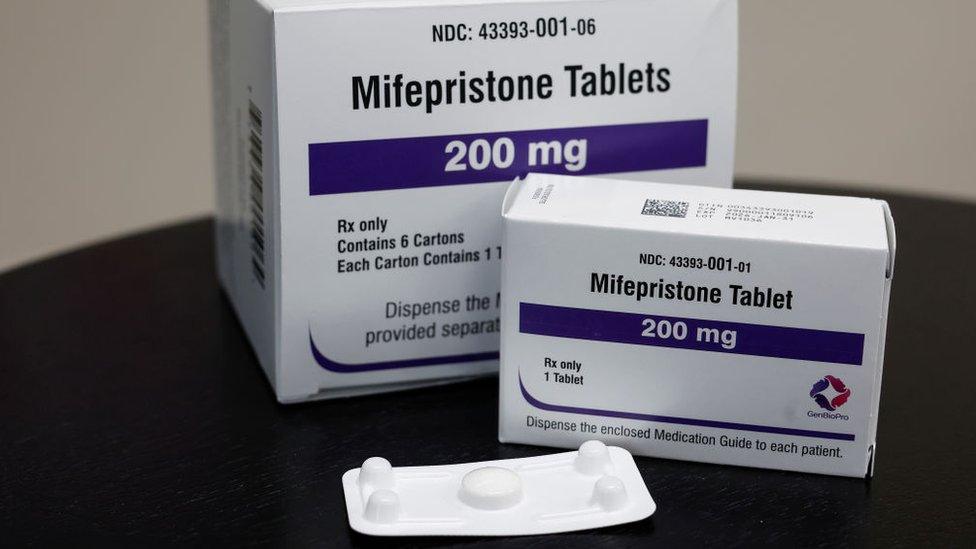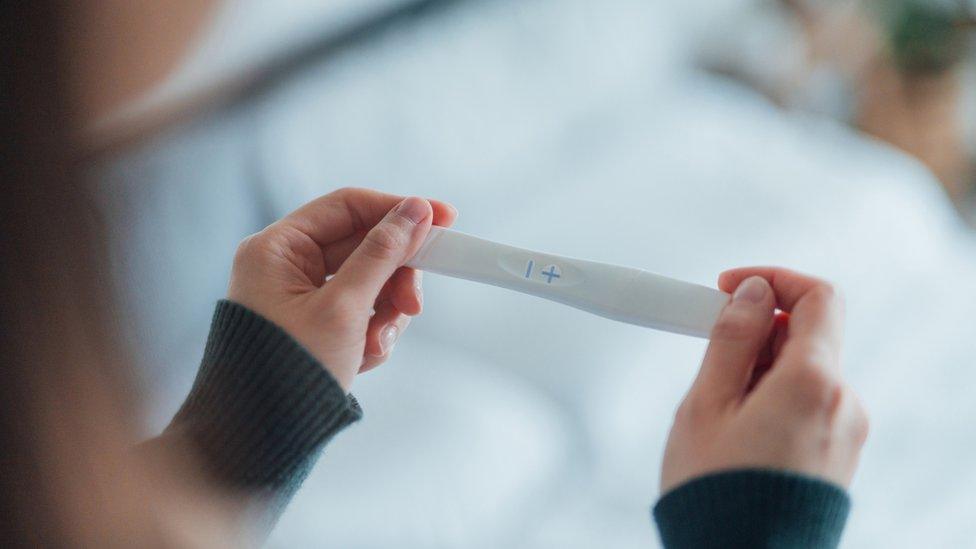Senior Tory MP seeks abortion law rethink after mother jailed
- Published

Conservative MP Caroline Nokes has called for a debate in Parliament on abortion laws
Parliament should debate overhauling abortion rules after a woman was jailed, the chair of the Commons equalities committee has said.
Caroline Nokes MP told the BBC the 1861 law used to prosecute mother-of-three Carla Foster was "out of date".
The 44-year-old was convicted of inducing an abortion outside the legal limit using pills at home.
Campaigners urged reform after she received a sentence of 28 months, 14 of which will be spent in custody.
Foster was between 32 and 34 weeks pregnant when she took medication acquired via the "pills by post" scheme introduced during lockdown, Stoke-on-Trent Crown Court heard.
Abortion is legal up to 24 weeks, and the procedure must be carried out in a clinic after 10 weeks.
Foster was initially charged with child destruction, which she denied, and later pleaded guilty to an offence under Section 58 of the Offences Against the Person Act 1861, external.
Under the law, women "who use drugs or instruments" that are "unlawfully administered" to cause an abortion could be "kept in penal servitude for life".
While abortion was legalised with the Abortion Act in 1967, the 1861 law was not repealed, meaning that women still face life imprisonment if they carry out an abortion over the legal time limit.
Ms Nokes, who chairs the Commons Women and Equalities Committee, said MPs should "decide in the 21st Century whether we should be relying on legislation that is centuries old".
The Tory MP told BBC Radio 4's World Tonight programme: "This is not something that has been debated in any great detail for many years now.
"And cases like this, although tragic and thankfully very rare, throw into sharp relief that we are relying on legislation that is very out of date. It makes a case for Parliament to start looking at this issue in detail."

Carla Foster obtained abortion pills after a remote consultation during lockdown
Labour MP Stella Creasy also called for urgent reform, telling BBC Two's Newsnight programme: "I don't understand in whose interests this case was."
Madeline Page, director of the Alliance of Pro-Life Students, described the case as a "sad situation" and said she would welcome a parliamentary debate.
The Society for the Protection of Unborn Children, which opposes abortion, criticised providers for "pushing for dangerous home abortions," and said women such as Foster were "left to self-administer these drugs alone with no medical supervision or support."
But providers say the most common side-effects of at-home abortions are "usually easy to treat", and "rarely have any long-term health effects".
The British Pregnancy Advisory Service (BPAS) is one of 30 campaign and health groups calling for the law to be repealed to decriminalise women seeking to end their own pregnancies.
BPAS chief executive Clare Murphy told BBC Radio 4's Today programme: "We are now seeing a mother-of-three prosecuted under laws that do not exist in the same way in any other country."
She said "a growing number of women" were coming under police investigation over suspected illegal abortions, with another woman facing trial later this year.
A spokesperson for the Crown Prosecution Service said cases such as that of Carla Foster were "exceptionally rare... complex and traumatic".
They added: "Our prosecutors have a duty to ensure that laws set by Parliament are properly considered and applied when making difficult charging decisions."
Downing Street said it recognised that abortion was "a highly emotive issue and there is a strength of feeling on all sides," but "the law is clearly set out."
"It's up to the police and the judiciary to enforce it," the spokesperson added.
Dame Diana Johnson, chair of the home affairs select committee, called for the government to decriminalise abortion.
She told BBC Radio 4's Today programme: "Removing the criminal law is a very sensible, reasonable step, but it's not to deregulate abortion care and who can provide it."
The CPS argued in court that Foster had been aware of abortion limits and had provided false information during a remote medical consultation.
Her defence said lockdown and minimising face-to-face appointments had changed access to healthcare, adding: "This will haunt her forever."
Foster went into labour on 11 May 2020 and the baby was confirmed dead 45 minutes later.
If you have been affected by the issues raised in this article, help and support is available via BBC Action Line
The 44-year-old from Staffordshire had moved back in with her estranged partner at the start of lockdown while carrying another man's baby, the court heard.
Sentencing, judge Mr Justice Edward Pepperall accepted she had been "in emotional turmoil" as she sought to hide the pregnancy.
He said she was a good mother to her three sons, one of whom has special needs, and that a suspended sentence might have been possible if there had been an earlier guilty plea.
But he rejected appeals from women's health organisations to pass a non-custodial sentence, saying it was the court's duty to "apply the law as provided by Parliament".
Ahead of Monday's hearing, a letter co-signed by a number of women's health organisations was sent to the court calling for a non-custodial sentence.
The judge told the defendant the letter's authors were "concerned that your imprisonment might deter other women from accessing telemedical abortion services and other late-gestation women from seeking medical care or from being open and honest with medical professionals".
But he said it also "has the capacity to be seen as special pleading by those who favour wider access to abortions and is, in my judgment, just as inappropriate as it would be for a judge to receive a letter from one of the groups campaigning for more restrictive laws".
Related topics
- Published12 June 2023

- Published31 May 2023
